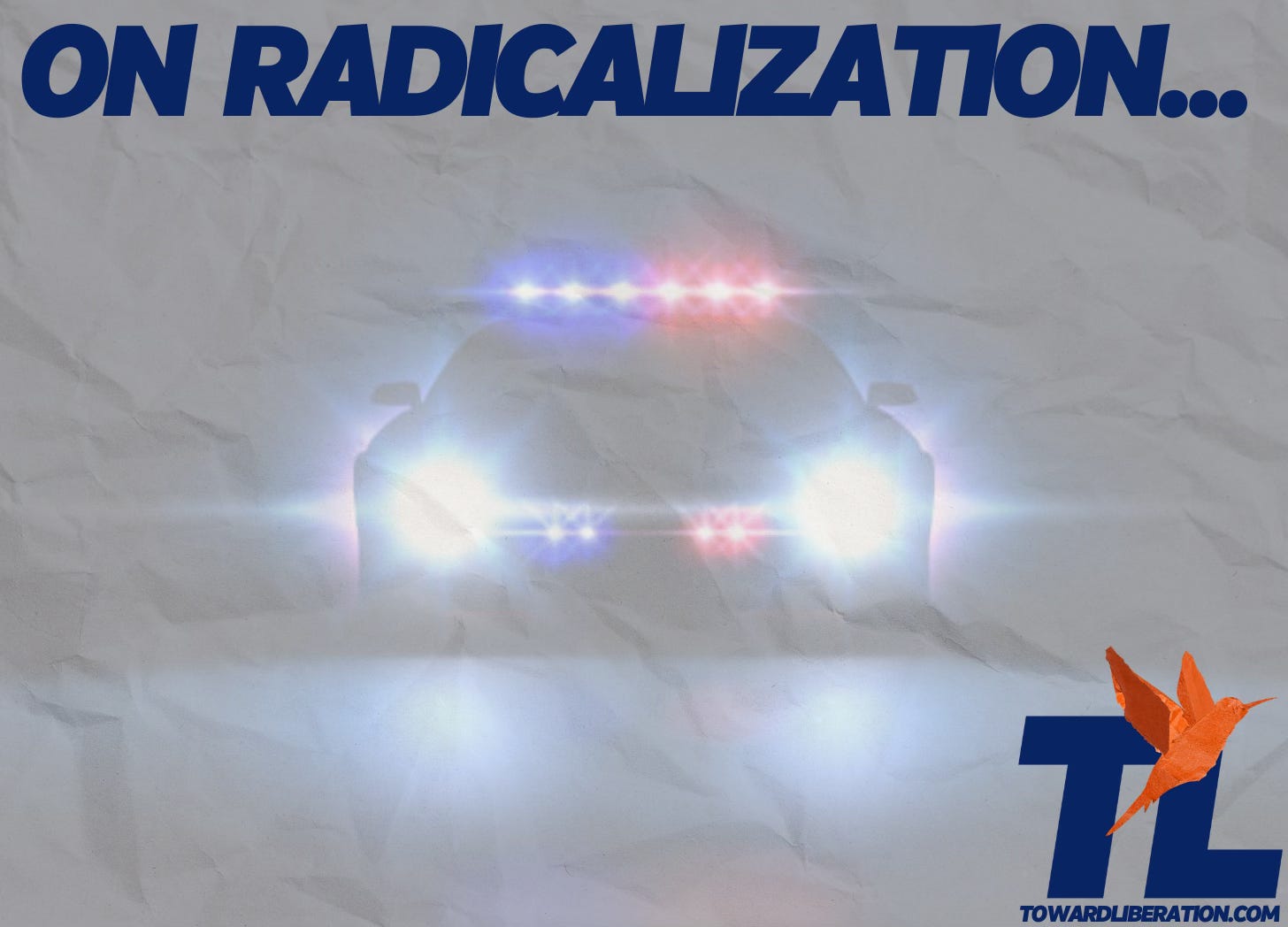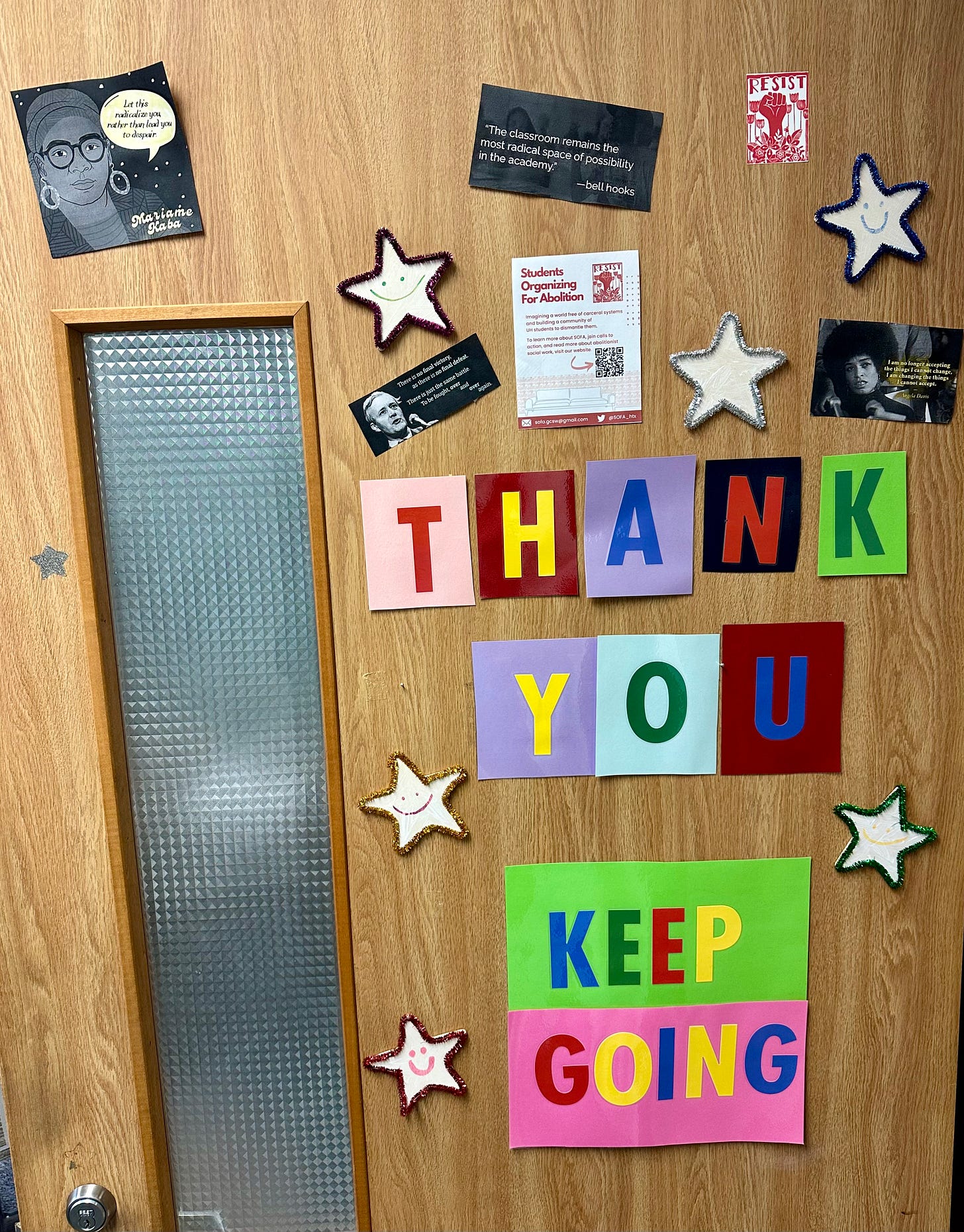On Radicalization...
“When a fact or set of facts prompts people to change course, it’s usually because someone or something has interrupted the narrative they knew and told a story that feels more true—one worth making changes over.” - Kelly Hayes and Mariame Kaba, Let This Radicalize You
As I’ve been reading Let This Radicalize You, I’ve been thinking about my own journey of becoming radicalized. Like many of you, I think of this as an ongoing process or evolution. I can think of many specific events that have been part of this evolution, some of which I’ve written about here and continuing through today as Israel continues its genocidal assault on the Palestinian people. But when I think about this evolution, I always think of an initial spark that, as Kelly Hayes and Mariame Kaba write in Let This Radicalize You, interrupted a narrative for me and told a story that felt more true.
As many of you know, my husband Vince and I have been together for 25 years now. In the early years of our relationship – probably 20 years ago – when we lived in Fort Worth, Texas, where we met as undergrads, Vince was arrested one night for driving with a missing light above his car's license plate. This wasn't the first time he had been pulled over by the cops while driving in Fort Worth – this had happened several times and always while he was driving by himself – but this was the first time he was arrested.
It was late, probably about 10:00 PM. Vince had gone to the grocery store to get ice cream – ice cream was a nightly thing for Vince, and we were out. He was pulled over on his way home from the grocery store, and he was frustrated – it was late, and the ice cream was melting, but mostly, he was frustrated because this was happening again. The cop came to the window of his car and explained that the light above the license plate was missing. After some back and forth where Vince was expressing his frustration about constantly being pulled over, the cop said, "If you don't want to be pulled over, why are you driving around at night with a missing light," to which Vince replied, "I don't know, why are you such a stupid motherfucker."
The cop pulled Vince out of the car and called for backup, and eventually, Vince was face down on the hood of the car with three police officers holding a gun to his head. He was arrested and taken to the Tarrant County jail. I learned that Vince had been arrested because a cop came to our house to bring me my wallet, which Vince had mistakenly taken with him. The cop explained what happened and said, "Look, he was asking to get arrested."
I was able to get Vince out of jail the next morning after paying a fine and some other charges. When I picked him up, I remember being angry with him. I was worried and afraid, but mostly, I was angry because I believed the cop's story. I was mad that he had talked to a cop this way, knowing there would be a consequence, and now I was having to get him out of jail for it.
What I remember most about this is Vince's response to my anger. I probably expected him to apologize or admit that he made a really bad decision, but instead, Vince was furious. He was furious at me for being angry at him. He was mad that I didn't understand the rage he carried inside him for being pulled over again and again for nothing—for no reason except the fact that he's Black—and on this night, he couldn't control that rage.
Even though Vince had grown up his whole life with his parents telling him how to act if he ever came into contact with the police because he was a Black man, on this particular night, the rage that he carried had built up to a place where he could not control it.
Before that moment, I had no understanding of this because my experiences had been so different from his. I didn't grow up believing the commonly held narrative (copaganda, really) that cops should be trusted or appreciated. But unlike Vince, I also had never experienced the violence, harassment, and intimidation that he had experienced his entire life. Understanding the rage he felt in that moment when he was pinned at gunpoint to the hood of his car and the anger he felt toward me for not understanding this shifted a narrative in me. I understood a story that was more true than anything I had believed before – a story that I knew was worth making changes.
Vince still carries that rage within him. I see it often, and although Vince has not been pulled over in many years now, I know that if he is, this rage will be there because rage is a natural and justified response to injustice. It has been the most dominant emotion I have felt in the subsequent moments that were part of my own radicalization. I am feeling rage now as I recount this story.
After I was removed from my dean position in December 2022, when I returned to my faculty office after the winter break, some of my students had decorated the door to my office.
In the top left, you can see a picture of Mariame Kaba with her quote, "Let this radicalize you rather than lead you to despair." I think of this quote every time I see images of the unrelenting violence and destruction being inflicted on the people of Gaza. I think of this quote when university administrators call the cops to violently assault their students who are peacefully protesting. And I think of this quote as the profession of social work, and many of the leaders within the profession continue in their unwavering silence in the face of genocide. It is a rage I'm sure many of you feel as well.
I continue to be incredibly grateful for this community and for this space to be in solidarity with each of you as we channel our righteous rage and many other emotions into becoming radicalized, or even more radicalized, and into our work toward liberation.
I hope you're continuing to read with us and engaging with the many incredible lessons and strategies found in Let This Radicalize You. I also hope you can join me and connease on Wednesday, May 29th at 6:00 PM Eastern for our monthly book discussion via Zoom. You can register to attend here:
We’d love to hear your thoughts throughout the month as well as you continue to engage with the book. You can share your thoughts here:
We look forward to seeing you on Wednesday, May 29th!
In solidarity,
Alan & connease






